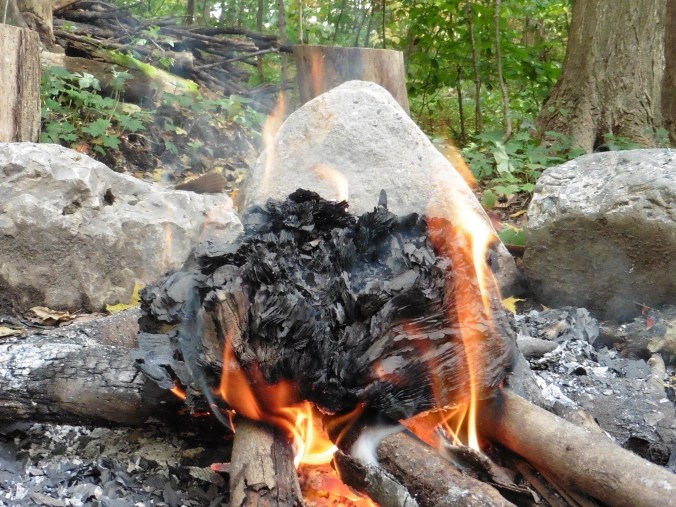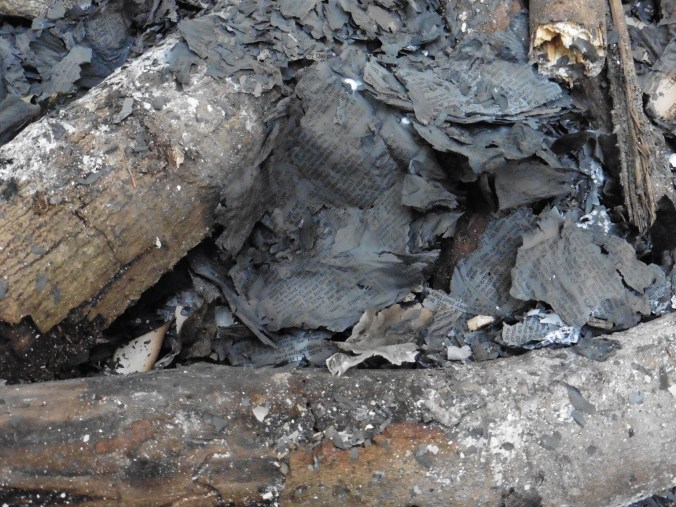A few days ago I cleaned off my study shelves and was shocked to discover that some books had gotten moldy. I’ve never had that problem before. Our Midwestern summer has been so wet that it makes me think of Flight Behavior, Barbara Kingsolver’s devastating novel about climate change. Among the moldy books were two Bibles that had belonged to my mother, old-fashioned, tissue-leaved, King James Version, well worn. I hated to part with them but the mold had penetrated the leather covers.
What is the proper way to dispose of a Bible? Protestant Christianity has no strict rules on that, as far as I know or could tell with a quick google. It should be done respectfully. I didn’t think it would be respectful to put them in the recycle bag with the junk mail, let alone send them to the landfill. The mold suggested perhaps they should be buried but moldering in the ground didn’t seem right, either.
I decided on a ritual burning, a kind of cremation, to initiate the firepit we’ve put in our woods but haven’t really used yet. I want to be cremated myself when the time comes, and, if this woods is still in our family at the time, my ashes will be scattered here. It seemed appropriate that the ashes of my mother’s Bible should be the first to bless the ground.
After going through my shelves I had a small stack of books and papers that could also fuel the fire. Some were moldy but most represented phases of my life that I was ready to bless and send on their way into smoke and ashes. Old cookbooks for ways I no longer ate. Articles and papers I wrote that I no longer care about, and publications I collected, for careers I no longer have. Thank goodness, at this time of my life I don’t have to think about credentials and resumes. The fire would be a joyful burning of old methods and requirements and a reverent burning of sacred texts.
I coaxed stubborn, damp sticks into a decent fire and started adding pages and chunks of books, saving the Bibles for last. The magazines and manuals made hot flames, and I especially enjoyed seeing pages of footnotes go up in smoke. When everything was ablaze, I topped the bonfire off with the Bibles. I didn’t tear them apart. I thought they would be consumed in a whoosh, with their thin pages.
Not so. The Bibles first opened up to the flame like flowers, but, once the edges of the pages were crisped, the flames died. I had to keep leafing through the Bibles with a stick, exposing fresh paper to be burned. The rest of the fire faded while I tended the Bibles, shuffling the pages and even beating them with the stick to keep the flames going. It was as if they were resisting the flames, or, at least, forcing me to consider exactly what I was doing. It was a painful process, and emotional. I was a little angry. “I’m just trying to give you a good cremation,” I said. I wondered if I was doing the right thing, after all.
What would my mother have thought? I think she would have approved of the method–she always liked a good fire–but she would have laughed at my technique.
Finally, when one of the Bibles had burned down to the spine, I rebuilt the fire with a few sticks and placed the other, half-burnt text on top. This, finally, seemed like a proper cremation. For a few moments the fire was grand and only a little smoky as the Bible crumbled into fragile ash bearing traces of words.
I found a scrap of unburned Scripture containing the words, “bury my . . . .” Perhaps I should have, I thought, as I dropped the fragment into the dying embers.


In college I lived in a house with a bunch of punks and one day when we ran out of toilet paper they decided that using the pages of a bible that had been lying around was preferable to going to the corner store to get more.
I wasn’t really going anywhere with this anecdote. I guess I just mean that it’s nice that you cared enough to wonder if you were disposing of them properly.
Ha! Those old Bible pages are nice and thin but if you used the whole Holy Scripture you’d clog the pipes for sure.